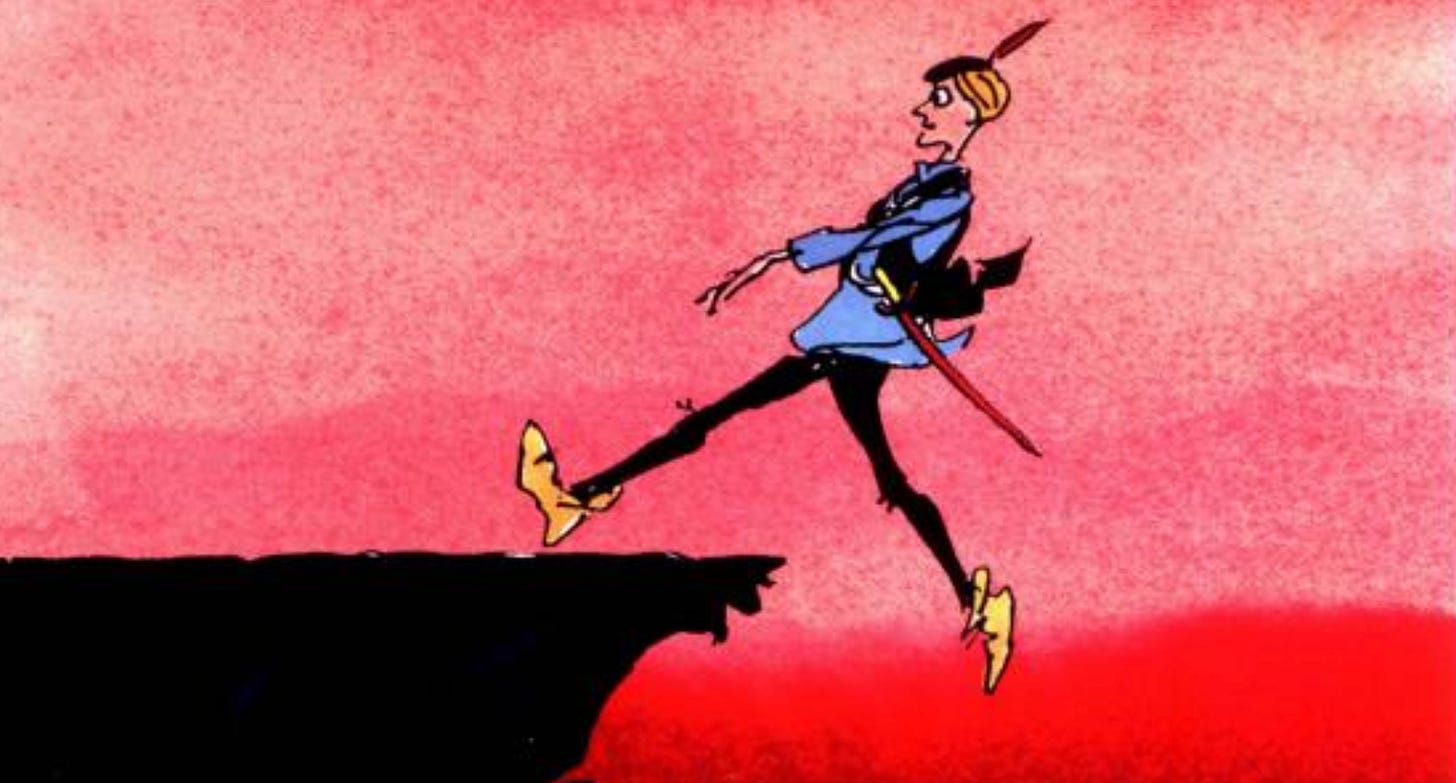Notes from a Vain and Selfish Lout
Unmoored in the Doldrums, a-wuthering in the heights
Edited by David Swanson

I’ve retained very little from The Phantom Tollbooth—a book I read as A Kid, because it was For Kids—but one of the things I liked best about Norton Juster’s 1961 novel was the way it portrayed sadness as a place. The Doldrums are a cloudy, colorless region where laughter is forbidden and smiling tightly constrained, where the schedules of the native Lethargians are full of dillydallying, procrastinating, rampant napping, dawdling and delaying; the Doldrums are where “nothing ever happens and nothing ever changes.”
The iconic illustrations for The Phantom Tollbooth are by Jules Feiffer, a phenomenal storyteller in his own right. Feiffer shared his personal vision of sadness-as-place in his comic bildungsroman A Barrel of Laughs, A Vale of Tears, which I read to pieces as a tween. In one episode, the hero—a prince named Roger who has been temporarily transformed into an eagle (it’s a long story, and worth reading no matter your age)—skims low over the Sea of Screams, “whose churning waves looked like they were writhing in torture.” As Roger swoops down to rescue the disembodied voice, he is nearly pulled to his doom: “The sea’s screams turned to whimpers. Sobs of ‘Help!’ Moans of ‘Help!” But who exactly was Roger to help? The roiling, broiling stained-dark sea gnashed its waves like teeth. ‘You cry ‘Help,’ but you don’t mean ‘Help.’ You mean you want to swallow me!’ If he couldn't trust cries of help, if cries of help could swallow and drown him... Roger’s sense of right and wrong felt dishonored. If this was meant to be a lesson, he didn’t want to learn it.”

Later, the hapless Roger flies across the Mountain of Malice, which flings rocks at him—but more dangerous are the notes affixed to the rocks, full of messages like “YOU ARE A VAIN AND SELFISH LOUT” and “YOU CANNOT HOLD ONTO YOUR FRIENDS.” “THEY DESPISE YOU.” “YOUR QUEST IS A DISASTER.” And Roger suffers a “mortal wound” from the notes, which hurt worse than the rocks: “Each one contained a crushing truth. At least, Roger believed them to be true. They had the ring of truth. Rocks don’t lie.” Which is just about the best description of the bitter interior monologue of the depressive as any I’ve heard. (Don’t worry, though, Roger winds up okay; it’s a fantastic book.)
If I had to describe my own melancholy as a place, it would be closer to Norton Juster’s vision of changeless grayness, a place where desire and energy both evaporate into a swaddle of dense cloud. When I was a kid reading British novels, this state of being was what I pictured when characters mentioned “the moors.” I imagined the moors—which were apparently peopled by some sort of gray plant called heather and little else, as the place where sadness went to grow—full of sly little hummocks that could trip you, and ancient barrows where dead men slept under the earth, and winds always a-wuthering.
Sadness, for me, has never borne an especial relation to any external event or circumstance, although it paradoxically tends to settle on me hardest after some big achievement—I cried so hard the day I got into Harvard my head ached, although I don’t remember why. But it’s a trip to the mental moors always, a fog-shrouded and treacherous landscape whose edges are always just over some jagged horizon. The given pace of the traveler through the moors is the plod, and it is only this slow gait that will carry you to some end, eventually, if you are patient enough, and if the fog and the barrow-wights don’t drag you to some bad end, and you continue to muster the will to put one foot in front of the other and keep plodding. (Cue Kate Bush’s “Wuthering Heights”: ‘out on the wily, windy moors…’)
The Sword and the Sandwich is a newsletter about serious extremism and equally serious sandwiches. Please consider supporting this work with a paid subscription:
All of this is, as usual, a very long throat-clearing to tell you why there isn’t a proper column this week: I’m having a tough one, lads, moored in the moors, for myriad reasons and none of them good enough. If I had to pick one more place sadness lives, I would pick a crossroads, and this is one: my deal with Substack—a year of relative financial stability in a freelance life that’s been up and down (mostly down) since 2018—has ended now, and I have to figure out how much, precisely, I am going to continue to pour into this newsletter, and how to monetize it more successfully, and how to, I don’t know, synergize yet diversify my income streams or something. It’s 2022, a year in which commodification of the self (or in my case, the self’s ability to write long, ponderous, florid sentences) is so banal as to be passé, but it remains the way I cobble together my rent.
On days like this I would kill for a newsroom job with a salary, but it would be easier to do a murder and get away with it than land such a gig (seriously, have you looked at homicide clearance rates in major cities lately? Less than half, often much less, appalling). At least I’m not a Protestant and can’t be accused of betraying some genetic work ethic, unlike a certain author friend of mine who casually mentions that she writes 2,000 words a day, works out, cleans, mothers excellently, and manages to be frugal yet devastatingly fashionable. I’m not her, and that’s okay (it’s not okay). I’m me, more’s the pity, a vain and selfish lout. On days like this I want to walk away; wuther in the heights; rest for a bit in the Doldrums where smiles are forbidden so I don’t have to fake one, or hollow out a spot in the heather to sleep away the ache, or scream like a cruel, deceptive sea.
But I am not going to do any of that.
What I am going to do is evaluate what this Substack is going to look like over the next few weeks, figure out how to gin up more paid subscriptions (please consider switching to paid if you’d like to support my ability to be a working writer!), investigate faith-healing scams targeted at cancer patients, continue to doggedly munch through the List of Notable Sandwiches, write some paid-only Ask A Banner Carrier advice columns, possibly spend a week or two working on a goat farm, mulch my garden before the first frost, try to help trap the pregnant alley cat that likes to sleep on my outdoor chair before she drops her litter onto the cold streets, take a good hard look at the homeschooling lobby’s nefarious history and intentions, let my hair continue to topiary itself into a bouffant, make absolute gallons of soups, watch with chagrin as this farce of a midterm election is increasingly determined by officials who do not, in point of fact, believe in democracy … and so on.
In short, I’m not giving up. I’m going to plod my way out of the Doldrums with ungainly feet attached to my swollen stumpy body, continue to chronicle the rise of fascism in the U.S., and scribe and job-hunt my way through autumn’s end. I hope you’ll stick around for the ride, even as this place changes a bit.
With love,
Tal








I am with you, wherever your literary journey leads. Depression is not my challenge, but anxiety is, and it grows worse. For whatever reason, reading your work calms me and gives me hope, as it makes me both smile and just as often cry. Thank you for what you do. ❤️
I subscribed on day 1, and recently renewed, and I am happy to have done so. The Phantom Tollbooth was a book I connected with deeply as a kid and even so, at this point in my life there's little I could describe of it besides the Doldrums, which seemed like a very real place to me at the time. In any case I consider it a privilege to read what you produce here and I look forward to what comes next